Ho-Chunk Gaming Madison Closing
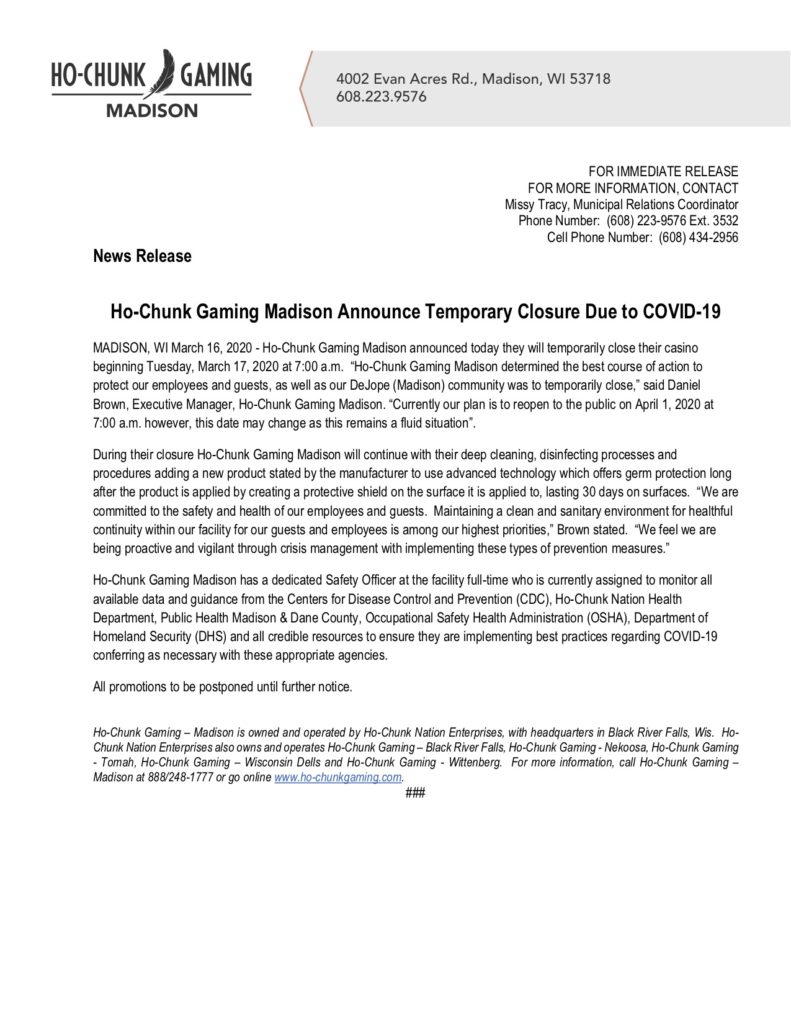


To: Community Members and Employees
From: Ho-Chunk Nation Department of Health
Re: Notification Response Plan
Date: March 16, 2020
At this time the Ho-Chunk Nation Department of Health does not have any positive COVID-19 cases to report. The situation continues to evolve quickly and the Department of Health will continue to monitor and work with our partner agencies to provide updated information to the public as it becomes available. The Department of Health will continue to follow the latest guidance from the Centers for Disease Control and the Wisconsin Department of Health to determine if any person requires testing.
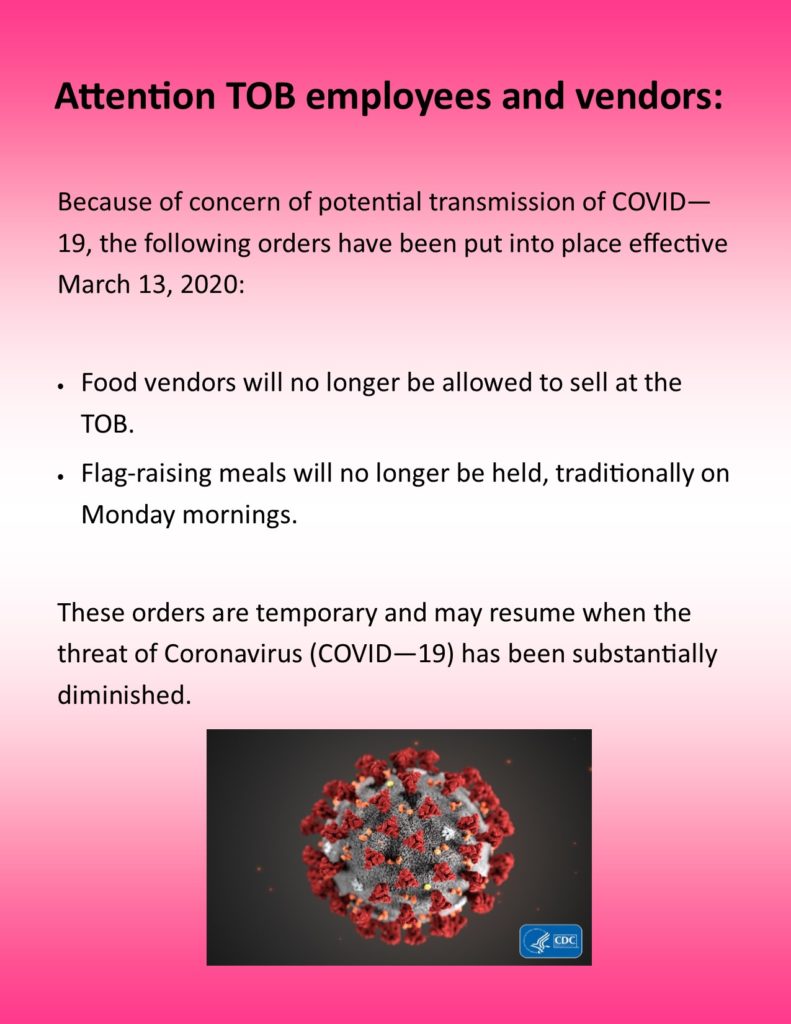
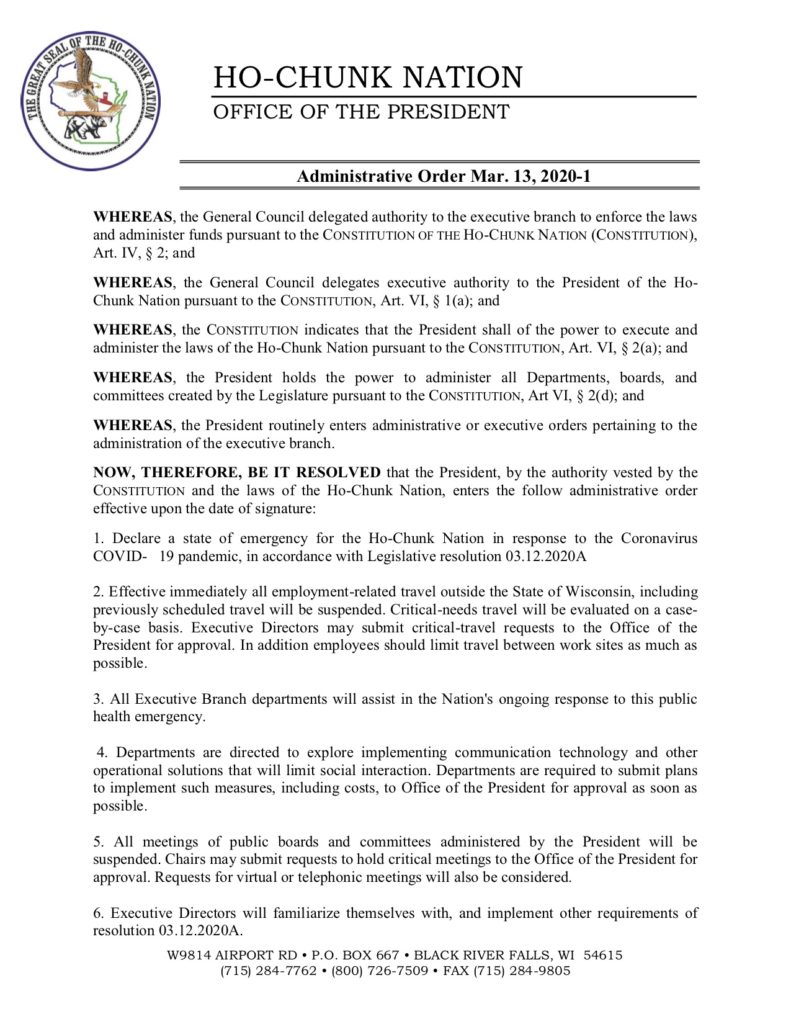
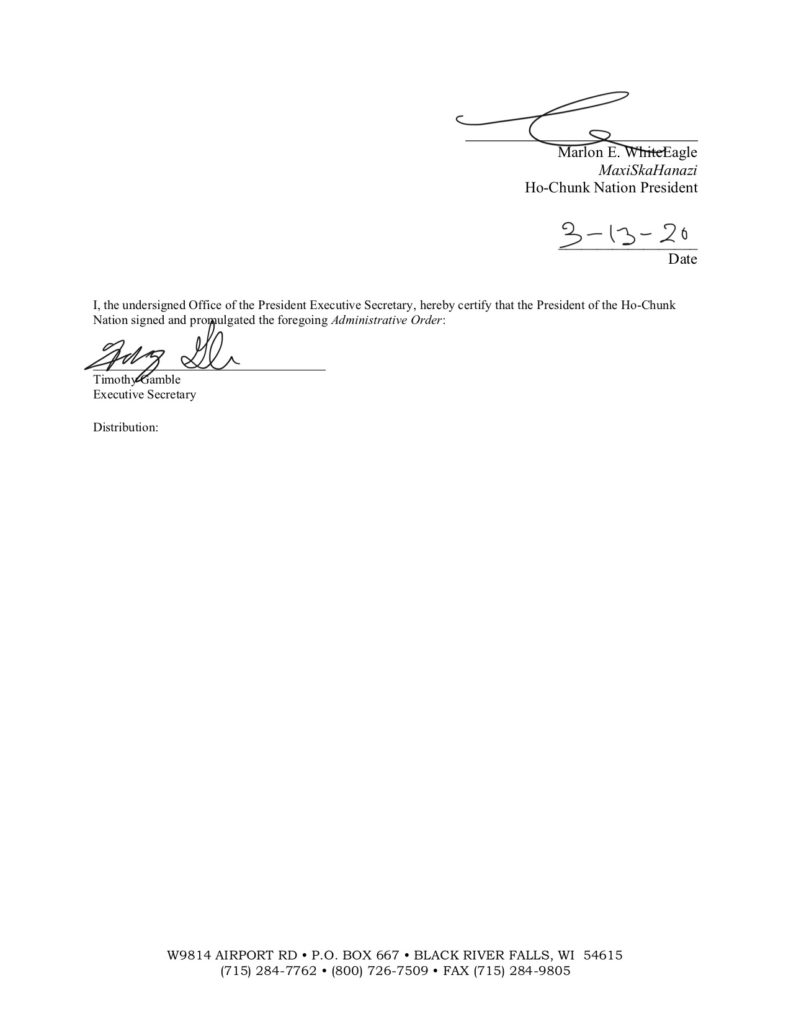
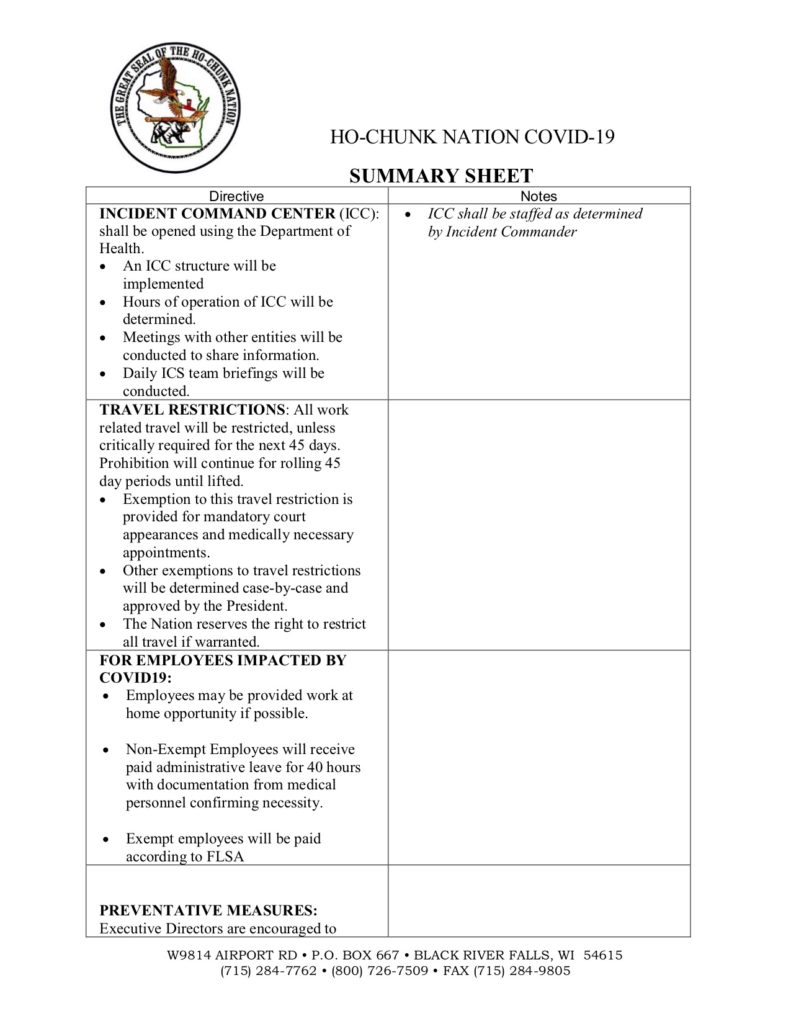
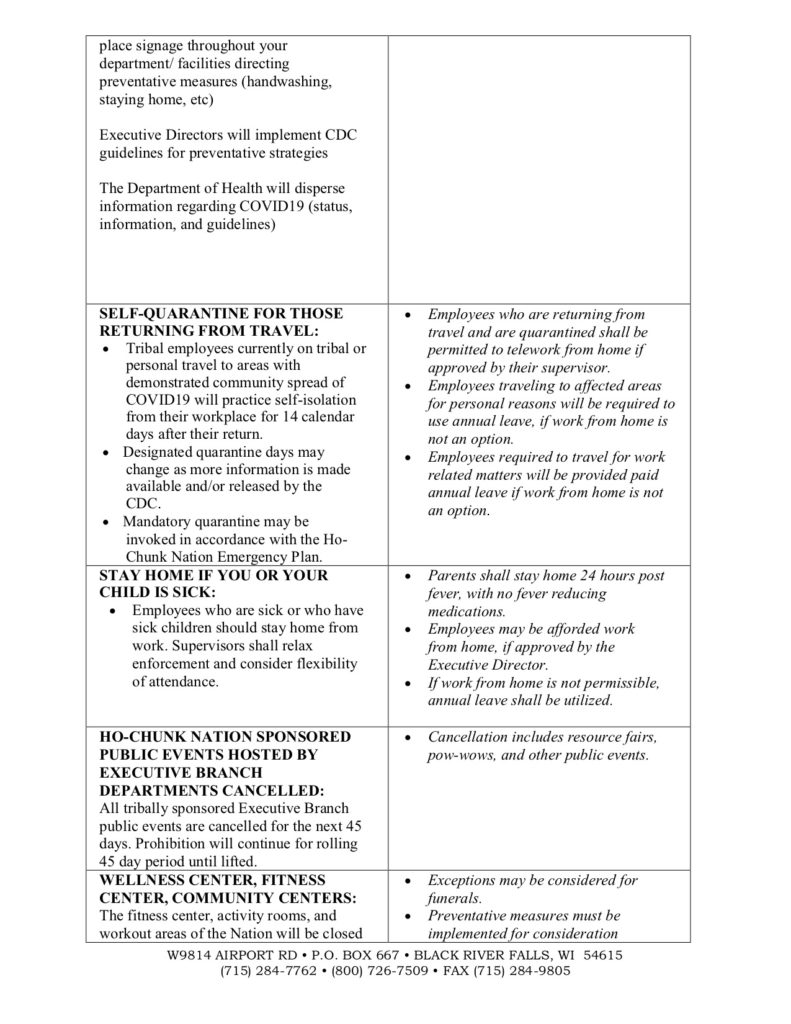
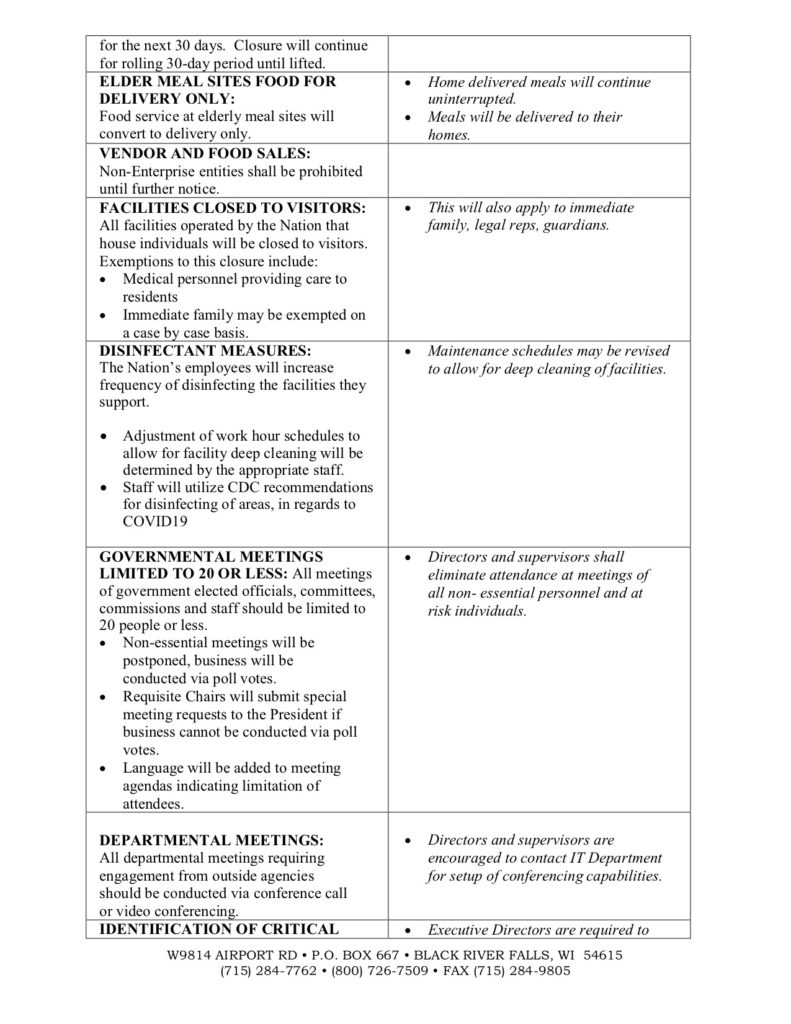
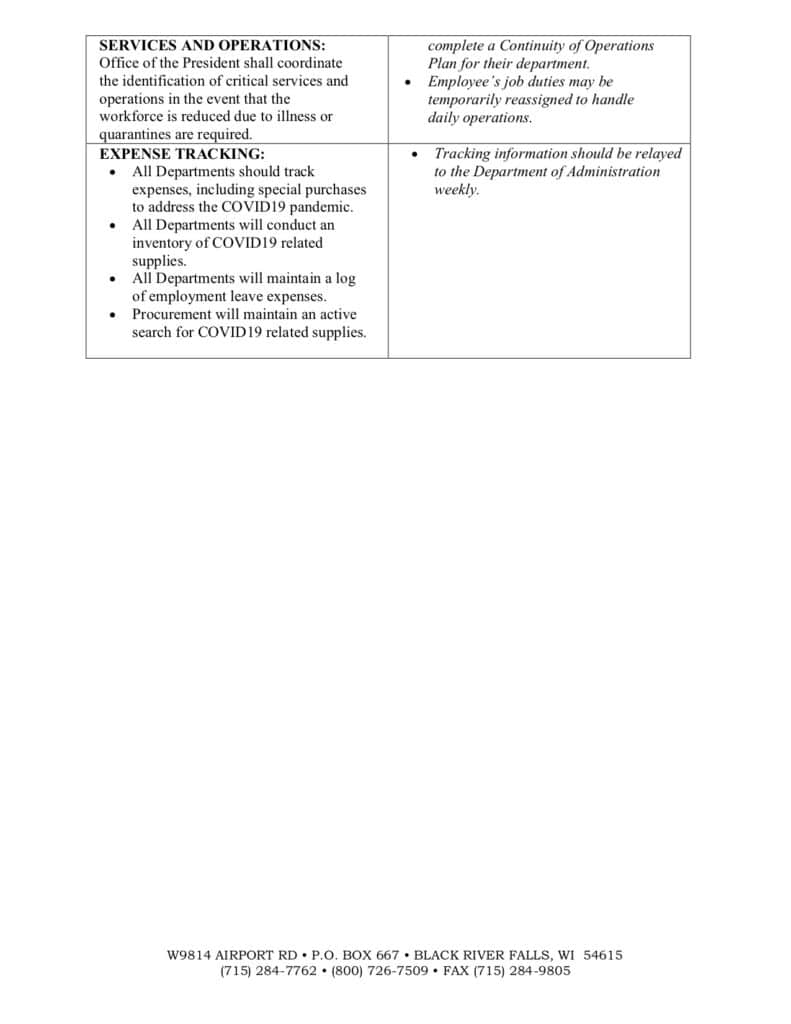

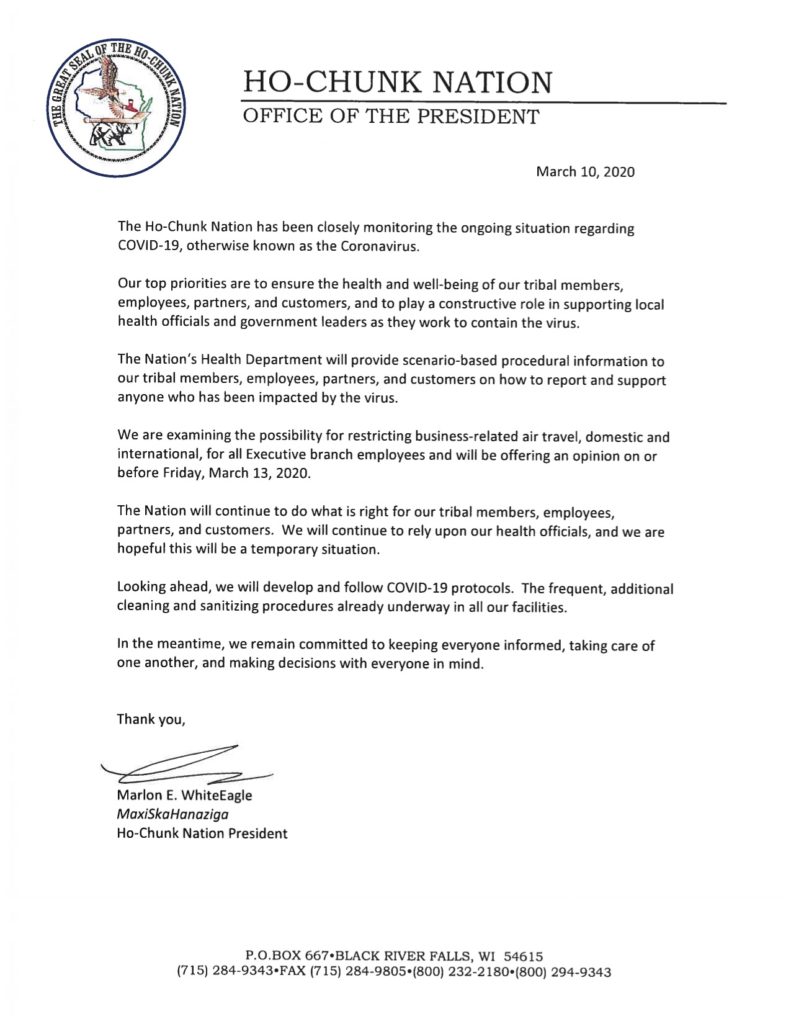
The Ho-Chunk Nation would like to announce that effective today, March 5, 2020 Wendy White Eagle will no longer be serving as the Executive Director of Business. She has served in this leadership position since July 2019 leading our Enterprises forward in a positive manner.
“Ms. White Eagle has performed admirably in her duties and has been a great asset to the Ho-Chunk Nation. We wish her the best in her future endeavors” President Marlon White Eagle.
The Office of the President will be naming a successor in the near future.
Over the past several weeks, the Health Department has closely monitored the Novel Coronavirus (COVID-19) situation. This includes several weekly calls with our Local, State, and Federal partners. The Health Department does have a Public Health Emergency Plan for addressing communicable disease incidents and we have practiced our Point of Dispensing plans with our internal and external partners, and we continue to work with them to address identified issues. At this time there are no suspected or confirmed cases of COVID-19 in our jurisdiction. If this occurs, we have protocols for notifying our employees and our partners including the Wisconsin Department of Health and the Centers for Disease Control who will assist us in implementing our plans. Please be aware that this situation continues to evolve on a daily basis so recommendations may change as more information becomes available.
At this time all employees should continue to follow the same recommendations that we do for annual flu season:
We have also created an email account specific to COVID 19, Coronavirus@ho-chunk.com. Emails will be returned within 24 business hours. If there are questions or concerns from other departments or divisions within the Ho-Chunk Nation please forward those to Coronavirus@ho-chunk.com . If a patient has questions regarding the most up to date travel information please see https://www.cdc.gov/coronavirus/2019-ncov/travelers/index.html for guidance.
Links:
By Ardith Van Riper
The Ho-Chunk Nation Language Division along with the participants from the UW-Madison Tribal Libraries Archives and Museums (TLAM) class hosted a thank you luncheon on May 9 at the Language Division Office in Mauston.
Their unique partnership celebrates its third year of work on the Ho-Chunk Nation Digital Library project that helps the Nation curate and use its language resources while providing the UW students with a service learning project involving an actual working collection of materials.
The success of this project is primarily due to Omar Poler, instructor of the TLAM class at UW-Madison; Janice Rice, retired UW librarian and member of the Ho-Chunk Nation; and the students from the last three spring semesters’ TLAM classes. George Greendeer, who has previous genealogy work experience with the Nation’s Enrollment Division and co-authored People of the Big Voice: Photographs of Ho-Chunk Families by Charles Van Schaick, 1879-1942, was hired back in December as the Project Specialist.
TLAM is an effort at UW-Madison to bring indigenous information to library and information science education through coursework, service-learning, continuing education, community-building, networking, resource sharing, and long term partnerships with Native American cultural institutions. The TLAM course runs every spring.
This spring, the TLAM class worked in groups on the Ho-Chunk Nation Digital Library project. Kristen Maples, Amy Sampson, and Alicia Eldridge worked with the Ho-Chunk elders. The elders provided translation and background information on audio and video recording for the students to include in the catalog. These elders were Maxine Kolner, Andy Thundercloud, Georgia Lonetree, Elliott Garvin, Hope Smith, and Richard Mann.
Elders who are recorded on the audio or video reviewed to date are Kenneth Funmaker, Sr., Edward Lonetree, Jr., Corina Lonetree, Sidney Hall, Ardella Quackenbush, Bill O’Brien, Merlin Redcloud, Gordon Thunder, Annabelle Lowe, Maxine Kolner, Lila Blackdeer, Wayne Falcon, Rebecca Greendeer, Tom Hopinkah, Myron Lowe, Eugene Cloud, George Stacy, Cecil Garvin, Larry Garvin, Richard Mann, Dennis Funmaker, Sr., Chloris Lowe, Velma Lewis, Arvid WhiteEagle, Carlos Funmaker, and John Greengrass.
UW-Madison studentsAlianna Bozhardt, Alicia Eldridge, and Kristen Whitson worked on policy. Policy included Deed of Gift form, Donor Guide, and applicable copyright and intellectual property law.
Justin Cornille, Samantha Wolfe, and Sarah Drake worked on cataloging. Kristen Whitson and Sarah Drake worked on scanning. Dani Fulwilder worked on archival.
The Digital Library project began three years ago with planning on what needed to be done to catalog, digitize, and archive the Language Division’s audio, video, and written documents. The initial steps were sorting and organizing material. Then converting all the Nation’s audio and video recordings and scanning the hard copy written documents into digital files.
Each item is meticulously cataloged using 36 fields of keywords and descriptor details, which are being filled in as the group of students and Nation staff make their way through each item.
Items are then uploaded to the Mukurto (MOO-koo-too) management system after the cataloging process has been completed. This management system is where users will be able to search online and see items that are in the Language Division’s collection. The total number of files in the catalog exceeds 1,000, and that number will be more significant when the site goes live.
“Users will be able to create an account, and then the users will be grouped into what are called communities. They’ll be levels of access. Depending on the type of material and subject matter, we can group people by user class group and then assign them the kind of access that we want them to have,” said Division Manager Adrienne Thunder.
“We can even change the setting so that only students and mentors from the Language Apprentice Program can access these materials or only employees of the Language Division. There is no limit to the number of layers we can create,” said linguistics student Andrea Cudworth.
Thunder says tribal members will have specific access that the general public wouldn’t have. Eventually, this will all go through the Language and Culture committee to determine the accessibility of the items.
The Nation benefits from having language resources made more accessible, better accounting of materials, and preservation of the original materials. Some language resources include audio and video capturing the spoken Ho-Chunk language, children’s books in the Ho-Chunk language, photos of Ho-Chunk ancestors, Ho-Chunk dictionary, photos of Ho-Chunk crafts, Ho-Chunk language lessons, and the collection keeps growing.
The project provides valuable professional and learning experiences for UW-Madison students.
“All of us are library and information study students that means we are studying to become librarians and archivists. I have to tell you that for me, I am in archives to do exactly what we got to do here. This has been a very fulfilling experience,” expressed UW-Madison Graduate Student Kristen Whitson.
Project Specialist George Greendeer said, “They (students) cataloged 500 items, documents. We were only expecting 300 for the semester because they had a lot of other stuff to do for their course study.”
The luncheon celebrating this work started with Division Manager Adrienne Thunder speaking and elder Maxine Kolner saying a prayer over the food. Janice Rice and Andrea Cudworth were each presented with a certificate of appreciation and a blanket for their efforts on the project.
The UW-Madison students prepared the food shared with Language Division staff and honored guests at the luncheon. The students who worked with the elders presented the elders and George Greendeer with homemade mini loaves of breads. Staff at the Language Division office were also gifted with an Instant Pot by the UW-Madison students.
Kelly Jo Funmaker attended, representing the Office of the President, and extended gratitude to the individuals who assisted in the project.
“I know that this one of the President’s top priority, not even for the Ho-Chunk Nation but himself also. I know that he would be very proud and very happy with what is going on today,” said Funmaker.
“The fact that they’ve (UW-Madison students over the past three years) not only categorized all of the material, digitized all of the material, and now we are to the point where we are starting to populate the site that’s going to developed for real use,” explains Thunder.
Some of the UW-Madison students have volunteered to return in the summer and continue their work.
Thunder says this work, as much as has been done, is only the beginning. “In the future, the Division hopes to add to the collection with contributions of materials collected by other libraries and museums, tribal and public personal collections, and the Division’s own continuing language revitalization work.”
The Nation’s Mukurtu database will house a vast collection of resources to aid us in the coming years as our Hoocak-first speaker availability declines and our new learners are adding to their knowledge and increasing their use of our language.
This article was previously published in the Hocak Worak
by Ardith Van Riper
Mad Dog and Merrill were at the Neesh-La Powwow grounds on Friday, August 23 filming. They were joined by Ho-Chunk Chef Elena Terry and prepared Indigenous foods and drink.
Mad Dog & Merrill are self-proclaimed “grillologists” and entertain thousands with the finer points of grilling. They travel the country performing in front of live audiences and host a TV show.
“We are doing a Native American cultural series with our good friends at NATOW,” said Mad Dog.
The Ho-Chunk Nation and Native American Tourism of Wisconsin (NATOW) sponsored the event.
“NATOW works with the 11 tribes of Wisconsin to promote and market cultural tourism in a way that is sensitive to our culture and those things that we hold sacred to us,” said Apache Danforth, Tribal Tourism Development Director.
“We partner with shows like Mad Dog & Merrill. They are a nationally syndicated show. That is one way NATOW can promote and market events like this, things that are happening in Native Wisconsin, the powwows, and any events that are open to the public.
“We purchased four episodes of this show and we brought one here. One is going to Bad River, the other is going to St. Croix, and at the end of September there are Treaty Days in Madeline Island. Should be fun!”
Merrill asked Elena Terry what an Indigenous Food Chef is. She responded with, “We work on re-introducing Indigenous ingredients into daily life of our communities, not just tribal members.”
While on camera, they grilled bison steak from Oneida and prepared bison burger mixed with blueberries on a cedar plank and an alder plank. Also on the grill were onions and peppers on a maple plank.
Merrill prepared succotash which includes beans, sweet corn, beef, and squash. He also made some tea from fresh lemon, fresh ginger, fresh mint, strawberry, honey, and boiled water.
They aimed at preparing Indigenous foods and drink.
“Indigenous foods are ancestral foods. Foods that are native to the land, foods that we traditionally ate,” said Terry. “Most recently, we try to get it out there a little bit more and build stronger communities. It just ties back into the land.”
Elena Terry started Wild Bearies and they went into a discussion about it.
“Wild Bearies is a community outreach catering company that works to reintegrate community members back into our community through food. We are seed savers. We grow ancestral ingredients,” explained Elena Terry. “Then we go out and share that with our community.”
Mad Dog gifted Elena Terry with some seeds.
Public Relations Officer Forrest Funmaker stated, “The Ho-Chunk Nation had a great time working with the Mad Dog and Merrill Show.
“The Nation thanks Native American Tourism of Wisconsin for bringing the grill challenge to the Neesh-La Powwow.
“The Nation would also like to thank Elena Terry for bringing her newfound indigenous chef talents back to the Nation in her busy schedule.
“They all went above and beyond to make the show as Indigenous as possible. They also loved how well pow-wow committee and Ho-Chunk Gaming – Wisconsin Dells worked with getting all the logistics taken care of so that they can produce an off the hook show.”
The episode filmed at Neesh-La Powwow is scheduled to air Sunday, September 22 on WEAU at 10:30 AM.
This article was previously published in the Hocak Worak